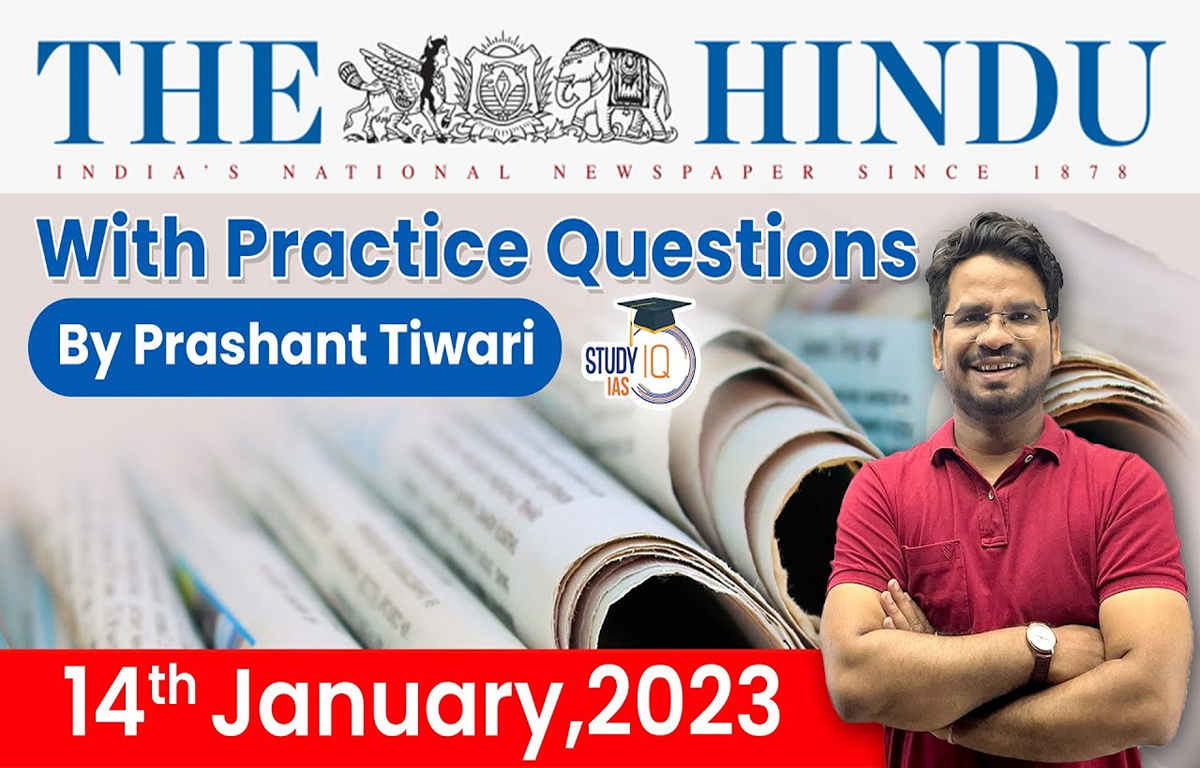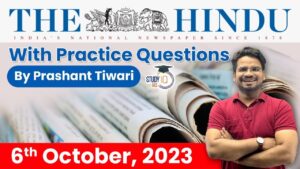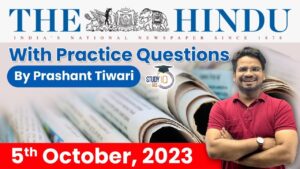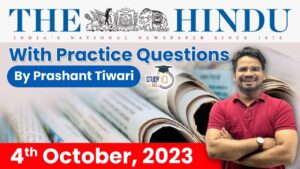The Hindu Newspaper Analysis for UPSC

The Hindu Newspaper Analysis 13 January 2023
- The Supreme Court on Friday said the “buck ultimately stops with the government” to clamp down on hate speech and hate crimes, as they are offences committed on society.
- The government agreed that hate could not hide behind the colour of any religion.
- “We would not have liked the government to come in at all, but in certain areas when religious freedom, harmony and orderly progress are gravely affected, it has to intervene… Today what are we fighting about? We have more important things to achieve as a nation — people are starving without jobs,” Justice K.M. Joseph observed. Justice B.V. Nagarathna was also part of the Bench that was hearing a batch of petitions seeking curbs on hate speech.
- The remarks from the Bench came after Uttar Pradesh informed the court that it had registered 580 cases of hate speech in 2021-2022. Of these, 160 were suo moturegistered by the police. Uttarakhand said it had filed 118 cases.
- “We require a free and balanced media. But they are not balanced… We have got TV for decades now, but you [government] have not thought of anything for TV. Therefore it has become a free-for-all,” Justice Nagarathna said.
- Asking if any anchor had been “taken off air” to send a message against triggering hate or bias on TV, the court said “if freedom is exercised with an agenda, you are not actually serving the people but some other cause. Then you have to be dealt with”.
- The Supreme Court directed Delhi Police to file an affidavit listing the steps taken to probe cases of hate speech in the capital.

- A sharp 61.2% sequential increase in capital spending by the Central and State governments propped up overall fresh investment plans announced in the third quarter (Q3) of 2022-23 to ₹7.1 lakh crore, even though private sector investments dropped 41% from ₹6.31 lakh crore in Q2 to ₹3.71 lakh crore between October and December 2022.
- Capex is defined the as money spent on the acquisition of assets such as land, buildings, machinery, and equipment, as well as stock investments.
- Crowding-in is a phenomenon that occurs when higher government spending leads to an increase in economic growth and therefore encourages firms to invest due to the presence of more profitable investment opportunities.

- As India adopted the Westminster model of parliamentary democracy, the Constituent Assembly decided, on May 18, 1949, to adopt this practice. Article 87 of the Indian Constitution requires the President to make a special address to both Houses of Parliament assembled on the commencement of the first session of each year.
- Similarly, Article 176 requires the Governor to make a special address at the first session of each year of every State Legislative Assembly and to both Houses wherever the State also has a Legislative Council. The language of these provisions were borrowed from the rules of the House of Commons.
- Jawaharlal Nehru, speaking in the Lok Sabha on February 22, 1960, stated that the President’s address is nothing but a statement of policy of the government. He observed: “If the President’s address has anything wrong in it or objectionable in it, it is the government to blame not the President, and it is open to hon. Members to criticise or condemn government because there is some such statement in it which they disapprove of”.
- The Calcutta High Court, while interpreting this article in Syed Abdul Mansur Habibullah v. The Speaker, West Bengal Legislative Assembly (1966), held that the special address is not an idle or ceremonial formality. It keeps the members informed about the executive policies and legislative programme of the State government. The High Court further observed that the non-delivery of the special address hampers legislative debates and budgetary criticisms.
- There has never been an incident of the monarch in the U.K. departing from the official text of his speech. The Governor of Tamil Nadu, R.N. Ravi, made constitutional history in the State by omitting certain paragraphs and departing from the official text of his special address at the opening of the Legislative Assembly of Tamil Nadu for 2023.
- Professor K.T. Shah proposed an amendment to Article 87 giving discretion to the President to also make an address on “other particular issues of policy he deems suitable for such address”. This amendment was rejected as B.R. Ambedkar pointed out that the President, under Article 86, had the right to address either House or both Houses of Parliament together and Parliament had to assemble for this purpose. Similar power was given to the Governor under Article 175.
- Article 361 of the Constitution gives the Governor complete immunity from any legal action because our founding fathers hoped that Governors would maintain the highest standards of rectitude and propriety. It is disturbing that serious breaches of constitutional conventions continue to be made by Governors in States ruled by Opposition parties.
- The special address of the Governor is an important constitutional duty, which is performed with the aid and advise of the Council of Ministers with the Chief Minister at the head.
- The constitutional role of the Governor is that of an elder statesman who brings a sense of gravitas to this high office, and by his oath, must preserve, protect and defend the Constitution and the law.

- Policy vacuums on deepfakes are a perfect archetype of this situation. Deepfakes “leverage powerful techniques from machine learning (ML) and artificial intelligence (AI) to manipulate or generate visual and audio content with a high potential to deceive”.
- First, since they are compelling, deepfake videos can be used to spread misinformation and propaganda.
- Second, there has been a history of using deepfakes to depict someone in a compromising and embarrassing situation.
- Third, deepfakes have been used for financial fraud.
- Deepfakes can be used to influence elections. Recently, Taiwan’s cabinet approved amendments to election laws to punish the sharing of deepfake videos or images.
- Currently, very few provisions under the Indian Penal Code (IPC) and the Information Technology Act, 2000 can be potentially invoked to deal with the malicious use of deepfakes.
- Section 500 of the IPC provides punishment for defamation. Sections 67 and 67A of the Information Technology Act punish sexually explicit material in explicit form.
- The Representation of the People Act, 1951, includes provisions prohibiting the creation or distribution of false or misleading information about candidates or political parties during an election period.

- It is fairly well-known that parliamentary legislation is subject to two limitations under the Constitution of India. One is by judicial review, or the power of constitutional courts to review legislation for possible violation of any fundamental right.
- Another is that no amendment to the Constitution should have the effect of destroying any of its basic features.
- While the first limitation is set out in Article 13, under which laws inconsistent with or in derogation of fundamental rights are void, the second limitation is based on the ‘basic structure’ doctrine evolved by the Supreme Court.
- Vice-President Jagdeep Dhankhar’s remarks questioning the basic structure doctrine propounded in the landmark Kesavananda Bharati case (1973) does not reflect the correct position of law.
- In his view, the basic structure doctrine has usurped parliamentary sovereignty and goes against the democratic imperative that the elected legislature should reign supreme.
- The idea that the basic structure doctrine undermines parliamentary sovereignty is simply wrong. Parliament is sovereign in its domain, but it is still bound by the limitations imposed by the Constitution.
- Parliamentary majority is transient, but essential features of the Constitution such as the rule of law, parliamentary form of government, separation of powers, the idea of equality, and free and fair elections ought to be perennially protected from legislative excess. It may be open to a new Constituent Assembly to come up with another constitution that changes these fundamental concepts, but a legislature formed under the current Constitution cannot be allowed to change its core identity.

- The Supreme Court on Friday decided to examine whether girls as young as 15 years can enter into wedlock on the basis of custom or personal law when such marriages constitute an offence in statutory law.
- A Bench led by Chief Justice of India D.Y. Chandrachud issued formal notice on the petition filed by the National Commission for Protection of Child Rights (NCPCR) against a recent order of the Punjab and Haryana High Court that a girl, on attaining puberty or the age of 15 years and above, could be married on the basis of Muslim personal law, irrespective of the provisions of Protection of Children from Sexual Offences Act (POCSO).
- Appearing for NCPCR, Solicitor General Tushar Mehta submitted that “girls as young as 14 and 15 are being married. Can personal law and custom be pleaded in the face of statutes such as POCSO and the Indian Penal Code, which make such marriages an offence?”
- The Kerala High Court had recently observed that provisions of POCSO would apply if the bride or groom was a minor, irrespective of the validity or otherwise of the marriage.
- The NCPCR, through advocate Swarupama Chaturvedi, has contended that laws such as POCSO and the Prohibition of Child Marriage Act are secular in nature and should apply to all sections of the society.
- The Prohibition of Child Marriage (Amendment) Bill, 2021 has sought to amend the Prohibition of Child Marriage Act, 2006, to increase the minimum age of marriage for women from 18 to 21 years.
- In December 2022, the top court had asked the government to respond to a separate petition filed by the National Commission for Women (NCW) to make the minimum age of marriage for Muslim women on par with persons belonging to other faiths. NCW, like the NCPCR, had raised the question whether personal law could override statutory provisions of POCSO, etc.
- The NCW had argued that the practice of marrying below the age of 18 would expose Muslim women to abuse and harassment, and further said that it was arbitrary and discriminatory.

- India’s bilateral trade with China reached a record $135.98 billion in 2022, Chinese Customs data showed on Friday, driven by surging Indian imports of Chinese goods that were up by more than 21% last year.
- India’s exports to China, however, fell in 2022, driving an already significant trade deficit beyond the $100 billion-mark for the first time. Figures released by the General Administration of Customs (GAC) in Beijing showed two-way trade was up by 8.4% last year to $135.98 billion, with India’s imports accounting for $118.5 billion, up from $97.5 billion.
- India’s exports to China fell from $28.1 billion to $17.48 billion. The trade deficit reached $101.02 billion, up by 45%, from $69.4 billion in 2021.
Q) Consider the following statements regarding Methane Emissions.
- Methane is more potent than carbon dioxide in terms of its global warming capacity.
- Majority of the methane emitted is from natural sources.
- Livestock farming, rice agriculture and biomass burning emits methane.
Which of the above statements is/are correct?
- 1 and 2 only
- 1 and 3 only
- 3 only
- 1, 2, 3
मीथेन उत्सर्जन के संबंध में निम्नलिखित कथनों पर विचार करें।
- ग्लोबल वार्मिंग क्षमता के मामले में मीथेन कार्बन डाइऑक्साइड की तुलना में अधिक शक्तिशाली है।
- अधिकांश मीथेन का उत्सर्जन प्राकृतिक स्रोतों से होता है।
- पशुधन खेती, चावल कृषि और बायोमास जलाने से मीथेन का उत्सर्जन होता है।
उपरोक्त कथनों में से कौन-सा/से सही है/हैं?
- केवल 1 और 2
- केवल 1 और 3
- केवल 3
- 1, 2, 3
Explanation:
- Methane, a greenhouse gas, is 80 times more potent than carbon dioxide in terms of its global warming capacity.
- Approximately 40% of methane emitted is from natural sources and about 60% comes from human-influenced sources, including livestock farming, rice agriculture, biomass burning and so forth.
Q) The Directive Principles are non-justiciable in nature. This implies that
- A citizen cannot move the court if the government fails to legally enforce the directive principles or even violate them in some instances.
- The government cannot enact laws to implement directive principles.
Which of the above statements is/are correct?
- 1 only
- 2 only
- Both 1 and 2
- Neither 1 nor 2
निर्देशक सिद्धांत प्रकृति में गैर-न्यायिक हैं। इसका अर्थ यह है कि
- यदि सरकार कानूनी रूप से नीति निर्देशक सिद्धांतों को लागू करने में विफल रहती है या कुछ मामलों में उनका उल्लंघन भी करती है तो कोई नागरिक अदालत नहीं जा सकता है।
- सरकार निर्देशक सिद्धांतों को लागू करने के लिए कानून नहीं बना सकती है।
उपरोक्त कथनों में से कौन-सा/से सही है/हैं?
- केवल 1
- केवल 2
- 1 और 2 दोनों
- न तो 1 और न ही 2
Explanation:
- If they are violated one cannot approach the court and seek their enforcement. Therefore, the government (Central, state and local) cannot be compelled to implement them. The Directive Principles, though non-justiciable in nature, help the courts in examining and determining the constitutional validity of a law.
- The Supreme Court has ruled many a times that in determining the constitutionality of any law, if a court finds that the law in question seeks to give effect to a Directive Principle, it may consider such law to be ‘reasonable’ in relation to Article 14 (equality before law) or Article 19 (six freedoms) and thus save such law from unconstitutionality.
Q) Consider the following statements regarding the office of the governor as mentioned in the constitution of India:
- The Governor of a particular state should not belong to that state.
- The President of India must consult the Chief Minister of the concerned state before making the appointment of the Governor of that state.
Which of the above statements is/are correct?
- 1 only
- 2 only
- Both 1 and 2
- Neither 1 nor 2
भारत के संविधान में उल्लिखित राज्यपाल के कार्यालय के संबंध में निम्नलिखित कथनों पर विचार करें:
- किसी राज्य विशेष का राज्यपाल उस राज्य का नहीं होना चाहिए।
- भारत के राष्ट्रपति को उस राज्य के राज्यपाल की नियुक्ति करने से पहले संबंधित राज्य के मुख्यमंत्री से परामर्श करना चाहिए।
उपरोक्त कथनों में से कौन-सा/से सही है/हैं?
- केवल 1
- केवल 2
- 1 और 2 दोनों
- न तो 1 और न ही 2
Explanation:
- The governor holds an independent office under the constitution. Options 1 and 2 are conventions and not mentioned in the constitution.
- It is solely on the discretion of the President on how he wants to appoint the Governor (given some qualifications mentioned in the constitution of India)
Q) Which one of the following suggested that the Governor should be an eminent person from outside the State and should be a detached figure without intense political links or should not have taken part in politics in the recent past?
- First Administrative Reforms Commission (1966)
- Rajamannar Committee (1969)
- Sarkaria Commission (1983)
- National Commission to Review the Working of the Constitution (2000)
निम्नलिखित में से किसने सुझाव दिया कि राज्यपाल को राज्य के बाहर का एक प्रतिष्ठित व्यक्ति होना चाहिए और गहन राजनीतिक संबंधों के बिना एक अलग व्यक्ति होना चाहिए या हाल के दिनों में राजनीति में भाग नहीं लेना चाहिए था?
- पहला प्रशासनिक सुधार आयोग (1966)
- राजमन्नार समिति (1969)
- सरकारिया आयोग (1983)
- संविधान के कामकाज की समीक्षा करने के लिए राष्ट्रीय आयोग (2000)
Explanation:
- The ‘Sarkaria Commission’ recommended that the Governor should be an eminent person from outside the state and should be a detached figure without intense political links and that he should not have taken part in politics in recent past and should not be a member of the ruling party.
Q) Mains Practice Question:
Identify five ethical traits on which one can plot the performance of a civil servant. Justify their inclusion in the matrix. (150 words)
पाँच नैतिक लक्षणों की पहचान करें जिनके आधार पर एक सिविल सेवक के प्रदर्शन की रूपरेखा तैयार की जा सकती है। आव्यूह में उनके समावेशन का औचित्य सिद्ध कीजिए। (150 शब्द)


 The Hindu Newspaper Analysis 6 October 2...
The Hindu Newspaper Analysis 6 October 2...
 The Hindu Newspaper Analysis 5 October 2...
The Hindu Newspaper Analysis 5 October 2...
 The Hindu Newspaper Analysis 4 October 2...
The Hindu Newspaper Analysis 4 October 2...





















